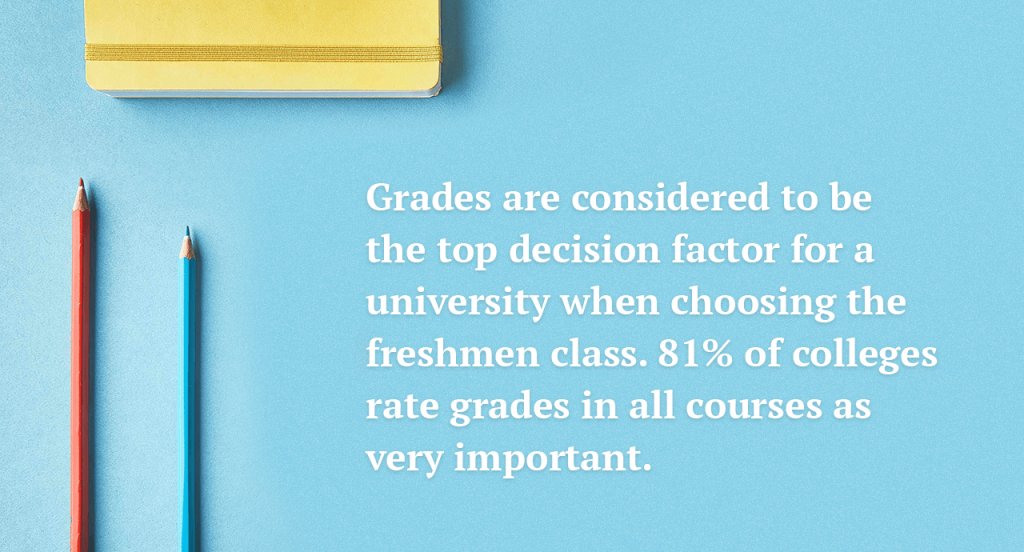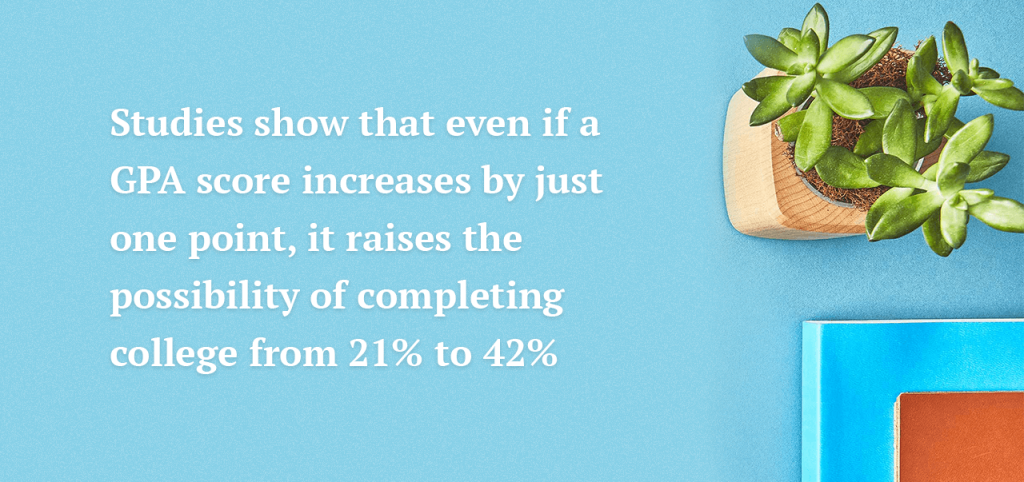To sum up all the information about a student’s performance in different disciplines, learning institutions use a grade point average (also known as GPA) system.
Today, we’re going to tell you more about that.
In particular, we will discuss earning the highest GPA possible and why it’s important. We’re going to list the benefits of having good grades, as well as the downsides of having a below-average GPA.
And that’s not all.
If you’re having problems with getting good enough grades, we’ve prepared a selection of tips that are going to help you improve your performance.
So stick around until the end. It’s going to be interesting.
A Good GPA—Why is it Important?
Long story short, the better you score on the GPA scale—the higher the chances you have of getting accepted into a prestigious university or receiving a decent job.
In terms of employment, GPA plays a more important role than you might think. Later, we’ll talk about what else your grade point average can tell about you.
But for now, the connection is quite simple. The higher the GPA you get—the better career start you’ll have (with more employers willing to pay you a high salary). Also, you’ll receive more job opportunities and, therefore, will have a better social life in general.
What is GPA and How to Calculate it

Before we get into discussing the pros of a good GPA and cons of a bad GPA, let’s define the term first.
GPA (grade point average) is a number that shows the average of all the final grades you’ve earned over the time of your studies. But if the number of credits is different for each subject, GPA calculation gets a bit more complicated.
To calculate your GPA, you need to add up the point value of all the grades you’ve earned and divide that figure by the number of grades received. As a result, you’ll get an average of all final grades you have. There are tons of GPA calculators to help you with that.
Benefits of a Good GPA
GPA is practically the only way to show how well you coped with your studies. And while you may perform better in some disciplines, a GPA score can demonstrate the overall situation.
Students with a high GPA get more recognition and have more opportunities available to them. For instance, a good GPA score can help you to apply for a scholarship, enroll in a graduate or post-graduate program, get involved in extra-curricular activities, and join different clubs and organizations.
A good GPA score is a way to show clubs, scholarship committees, universities and organizations that you’re a hard-working student who’s capable of reaching their goals and has ambitions. And it isn’t a secret that most organization are looking for such people.
Here’s a list of benefits that you can get from having a good GPA:
Broader opportunities
We’ve said it before, and we’ll say it again. The major and the most important benefit of good grades is a much bigger selection of opportunities. From elite high school programs to better chances of getting a scholarship (more on that later), to greater odds of receiving a well-paid job. And that’s just to name a few. To be honest, this benefit alone is too good not to try and do your best. Earning those high grades is worth it.
A wider selection of universities

Some colleges and universities accept almost every high school graduate who applies. Others are more selective and have a certain percentage of students allowed to study at the institution. And then there are universities that decline most applications, accepting 25% or sometimes even less of the students that apply. It’s no wonder that GPA plays a crucial role in the selection process. So, the higher GPA score you get—the more universities that will be happy to accept your application.
Scholarship
Most financial aid programs for students have a set of strict requirements. And almost all of them state a minimum GPA score. Knowing the fact that scholarships are given to a limited number of students, it isn’t hard to guess that an above-average GPA makes you eligible for more scholarship programs. Which, in turn, means you have a better chance of getting into one.
Ability to get involved in extracurricular activities
Some may say that if you’re studying hard, there will be no time left for anything “extra.” But look at this from a different point of view. If you decide to try out for a sports team, the coach will check your eligibility. Apart from your physical capabilities, they will also check your academic performance—including your GPA scores. If they’re high, your coach won’t have to worry that one day you’ll drop from the team because of a failed exam.

Career boost
The world’s top colleges and companies have that status for a reason. And to get a chance to be a part of said college or company, you must prove that you deserve it. Your great personality and claims that you’re hard-working, responsible, and dedicated are great and all. But people on admissions committees and at job interviews prefer to believe in facts and actual achievements. So in order for your career to skyrocket from the start, make sure to lay the foundation for it right away, by earning good grades.
Improved confidence
Outstanding achievements require hard work. And if you’re too afraid to put all your effort into reaching your goal, you’ll never know how it feels to get there. It’s only tough at the start. Once you begin succeeding, your confidence will grow, and it won’t be scary to go all-in anymore.
Better personal image
A high GPA shows more than how good you are as a student. We all know that it takes some effort to get those high scores. And your GPA can be proof that you will work to achieve your goals. It shows that you’re able to maintain perseverance and consistency during the study process. It is a sign of your commitment, time management skills, and ability to handle tough assignments.
Downsides of a Bad GPA
Now it’s time to talk a bit about the consequences of a low GPA.
Let’s face it, an average or below-average GPA score isn’t something most students aim for. GPA is an important metric in modern education, so it’s best to work on your academic performance.
Many colleges require students to maintain a certain minimum GPA score. If it gets too low, let’s say below 2.0, a student gets put on academic probation. If a student is unable to improve their score after a certain period of time, they can be kicked out, which results in financial loss and wasted time.
The same is true about some programs for a specific major. The difference is that the requirements can be even stricter. There are programs where a student has to stay above a 3.0 GPA with only a couple of lower grades allowed with no penalty. The only positive aspect of such courses is that it’s possible to repeat a course in case of failure.

Getting excluded isn’t the only bad thing (even though that’s a major one) connected to a low GPA score.
Having to prove yourself more
Talking to an admission’s committee or having a job interview will always be a challenge with a low GPA. The thing is that you’ll have to emphasize all of the other positive aspects about yourself to make people believe that you’re a good student or worker despite your lacking academic performance. It can sometimes even get as bad as having to format and compose your resumes and cover letters in a specific way.
Bad image
Earning good grades means having to find compromises and push through difficult tasks and assignments. A low GPA score shows that you were unable to do so, even though it was the goal you needed to achieve. And even if you’ll claim that you have a good and diverse personality, your GPA score may override that positive attribute.
Lacking skills and knowledge

Even if you paid full attention to subjects and disciplines that interested you the most but neglected the others (which resulted in a low overall score), it’s still bad news for you. It only means that you’ve missed out on developing your logic, critical thinking, and were unable to shift your attitude toward working on a higher overall score instead of focusing on a single discipline. Even if you’re an outstanding expert in your field, there is still some basic knowledge you need to have. And if you get in a situation where that knowledge is required, you risk embarrassing yourself.
Poor time management
Inconsistencies in your grades that led you to a low GPA score can show that you couldn’t manage your priorities and leave enough time for all disciplines. Whatever the case is, this is not a good sign when you’re applying for a job, or when trying to enter a university. And if that’s not enough, some might even interpret it as a lack of self-discipline, because you couldn’t push yourself to earn the desired score.
Other people’s judgment
Remember we said earlier that GPA has become an extremely important metric in modern education? Well, it is so important that other people may build their whole judgment about you as a person based only on your GPA. In other words, a higher GPA can be correlated with higher intelligence, better dedication and commitment, willing to work hard and meet your obligations. But a low GPA score can be interpreted as the opposite.
How to Improve Your GPA
If you see that your GPA score isn’t high enough, don’t leave it that way. Do something about it. Here’s a couple of tips that can help you change from only average to the highest GPA possible.
Take difficult classes
This might seem counter-intuitive, but more challenge can bring more improvement. As a result, you’ll progress faster and earn grades that you deserve. Please note that this advice is applicable for those who already have a good enough score but want to improve it.
Ask for help
There’s nothing wrong in asking for assistance when you need it. And many students who experience difficulties make the same mistake: they keep silent about it. But asking for help is a smarter decision than trying to figure out the solution to the problem on your own. Alternatively, you can look for essay examples that can be both a template you can follow for your own writing, and a great source of additional information.
Focus on your studies and follow the schedule
You need to fight the urge to procrastinate—whatever it takes. Creating an individual schedule can help you focus on achieving your goals. Have a session of critical thinking and work on your study habits. This usually shows areas that need improvement.

Find the right balance
Finding balance is a challenge many students fail. It seems that they can’t figure out where to draw the line between studies and social life, which results in poor academic performance. Spend a couple of days monitoring how much time you spend on different activities and then make the necessary adjustments.
Know your strengths and weaknesses
Pick the subjects you’re interested in the most. Also, keep in mind that the more classes you take, the less influence each class is going to have on your overall score. It doesn’t mean that you need to cram your schedule full. Just pick those that you think will keep you interested.
Set small goals and give yourself rewards
Instead of having one big goal of improving your GPA, have a set of smaller, more realistic objectives that you can achieve in a shorter period of time. Satisfying rewards will keep you motivated, so you’ll lower the chance of losing interest and dropping the whole idea.
Now you know that there’s a lot of sense in getting good grades. And even if your GPA gets too low, there are ways you can fix it.


![8 Brain-Boosting Hobbies to Help You Win at Life [Infographic]](https://ivypanda.com/blog/wp-content/uploads/2016/07/use-your-brain-happy-red-haired-girl-holds-both-index-fingers-temples-tries-think-before-acting-stupidly-smiles-happily-dressed-casual-summer-clothes-stands-against-white-wall-309x208.jpg)

Well explained the need for good Gpa and ways to improve it. Thanks for sharing.
Glad to help, Suraj!